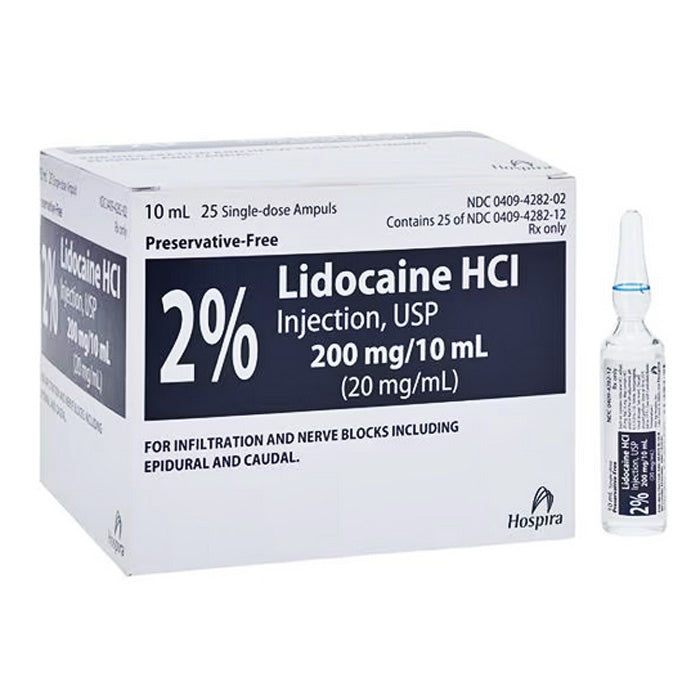Lidocaine 2% for Injection 10 mL Ampules 25/tray by Pfizer (RX)
(Note: We don’t Fill Personal Prescriptions)
How to Order:
You will receive instructions on how to create an account along with Rx Ordering Details.
Lidocaine 2% for Injection in 10 mL ampules is used as a local anesthetic to provide pain relief by inducing numbness in targeted areas during various medical and surgical procedures. It functions by blocking nerve impulses, thereby minimizing pain and discomfort. This concentration is particularly effective for minor surgical interventions, dental procedures, and local blocks. Its rapid onset and efficiency make it an essential tool in achieving patient comfort and optimal procedural outcomes in diverse clinical settings.
Lidocaine 2% for Injection is a sterile, non-pyrogenic local anesthetic solution used to provide local or regional anesthesia. It is commonly employed in medical and dental procedures to numb specific areas and prevent pain. The solution contains 2% lidocaine hydrochloride (20 mg/mL) and is provided in 10 mL ampules. Pfizer Injectables packages these ampules in trays of 25.
Details and Features:
Volume: 10 mL per ampule
Packaging: 25 ampules per tray
Concentration: 2% Lidocaine Hydrochloride (20 mg/mL)
Usage: Suitable for local infiltration anesthesia, peripheral nerve blocks, and other applications requiring localized numbing
Single-Dose: Designed for single-use application considerations
Mechanism of Action:
Lidocaine acts as a local anesthetic by blocking voltage-gated sodium channels in the neuronal cell membranes. This action inhibits the rapid influx of sodium necessary for the initiation and conduction of neuronal impulses. Consequently, this block prevents action potential propagation, causing a temporary loss of sensation in the targeted area, thus providing anesthetic effects.
Warnings:
-
Allergic Reactions: Contraindicated in those with known hypersensitivity to lidocaine or other amide-type anesthetics.
-
Systemic Toxicity: Excessive dosage, inadvertent intravascular injection, or rapid absorption may lead to systemic toxic reactions involving the central nervous and cardiovascular systems.
-
Proper Administration: Ensure correct techniques to avoid intravascular injection by frequent aspiration checks. Dosage should be adapted to individual health, body weight, and procedure needs.
- Special Populations: Use extra caution in patients with cardiac abnormalities, hepatic disease, or in the elderly, where lidocaine metabolism might be impaired.
Side Effects:
Possible side effects associated with Lidocaine 2% for Injection include:
-
Local Reactions: Occasional mild reactions at the site of injection, such as redness or swelling.
-
CNS Effects: Symptoms like lightheadedness, dizziness, restlessness, or at high dosages, more severe reactions such as seizures or unconsciousness.
-
Cardiovascular Reactions: May include hypotension, arrhythmias, or bradycardia in cases of high systemic levels.
- Allergic Responses: Though infrequent, allergic cases can manifest as skin rashes, itching, or in rare injections, anaphylaxis.
Lidocaine 2% should be administered only by trained health professionals familiar with potential side effects and emergency treatment protocols. Monitoring during administration is key, and resuscitation equipment should be available in case of adverse reactions. Dosages must be tailored to individual patient requirements and procedure types, ensuring safety and efficacy.


